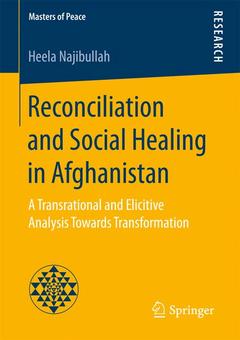Description
Reconciliation and Social Healing in Afghanistan, 1st ed. 2017
A Transrational and Elicitive Analysis Towards Transformation
Masters of Peace Series
Author: Najibullah Heela
Language: English
Subjects for Reconciliation and Social Healing in Afghanistan:
Support: Print on demand
Description
/li>Contents
/li>Biography
/li>Comment
/li>
Heela Najibullah analyzes the Afghan reconciliation processes through the lenses of transrational peace philosophy and Elicitive Conflict Transformation. The research highlights two Afghan governments reconciliation processes in 1986 and 2010 and underlines the political events that shaped the 1986 National Reconciliation Policy, drawing lessons for future processes. The author points out the historical and geopolitical patterns indicating regional and global stakeholders involvement in Afghan politics. Social healing through a middle-out approach is the missing and yet crucial component to achieve sustainable reconciliation in Afghanistan
Contextualization of Afghan Politics.- Analysis of Reconciliation through the Pyramid of Peace Actors.- National Reconciliation: 1986–1992.- Afghan Peace and Reintegration Program.- Social Healing: The Missing Component.- Geneva Accords 1988 and UN Five Point Peace Plan For Afghanistan.
Heela Najibullah is a peace researcher from the MA program in, Peace, Development, Security and International Conflict Transformation at the University of Innsbruck, a humanitarian worker in the field of forced migration who intends to start her PhD project soon.




